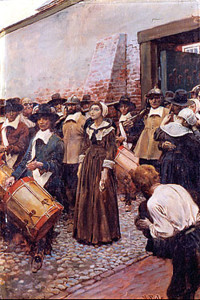Founding and the Future
In the 1630s, a handful of individuals left the cities of Boston and Salem to cross into territory to the south inhabited by the Wampanoag and Narragansett Indians. Inspired in many ways by Roger Williams, they were fleeing persecution and arrest for their ideas, which included the notion that all human beings had the natural right to their own conscience, liberty of thought, and relationship with God.

Howard Pyle (1853–1911), Mary Dyer Being Led to The Scaffold, ca. 1905. Oil on canvas, 30-1/2 x 21-1/2 inches. Gift of George L. and Virginia Dyer, 90.1. From the NHS collections.
The idea that religious devotion was not merely the following of a leader and a set of rules, but rather a very personal and intellectual endeavor that each of us, male or female, regardless of race or nationality, has the right to engage in, was incredibly radical. Most common at the time was a hierarchical establishment of belief and practice; nations adopted a religion and all who lived within its borders were required to belong. The creation of a tight, intellectually and behaviorally homogenous community of faith was the norm even for the Pilgrims and Puritans who came to the Americas seeking religious freedom for themselves.
The issue of course is that the whole world did and does not practice the same religion. The establishment of these tightly held religious and national entities were an affront to those whose beliefs did not conform to the national norm, and it created a climate that made it easy for nations to fall into conflict. The Early Rhode Islanders, with the tacit support of Charles II of England, sought to literally break this pattern and create a new way to live. One that banned state religions, and allowed each individual to make individual religious decisions.
This idea had implications. The Native population was not here for Christian exploitation, but rather had its own rights and agency, and the earliest Rhode Islanders did not settle until they made arrangements with their native hosts. Women did not always share the religion of their husbands, and this intellectual individuality may have led to other kinds of independence: in early Newport women worked, preached, and owned property. Sects banned elsewhere in the world, Quakers and Jews for example in the 18th century, came to Rhode Island and brought wealth, creativity, and international connections.
Make no mistake, the earliest European-born Rhode Islanders were not perfect, or even very good practitioners of the implications of their founding principle. They held slaves, though some openly questioned this contradiction. And, within 40 years of settling here, Rhode Island was sucked into a war with their Native American hosts that left both communities in flames and the first people’s populations decimated.
But, the idea did not die for lack of proper practice, and in fact it helped shape the American character and the ideology of American democracy today. The influence was not even just national; the ideals of separation of church and state and participatory democracy are certainly not universally accepted as the best way to live, but they are recognized across the globe as accepted practice or as aspirational goals for many.
And wait, there is more. One hundred and fifty years after the establishment of Rhode Island, and in the first years of the new republic whose founding ideology we helped shape, residents of Providence began to redefine how the world makes things. Samuel Slater continued a tradition of reinvention to begin the Industrial Revolution at Slater’s Mill. This act of creative entrepreneurship also changed the world.
What’s next for Rhode Island? Well, we do not know. But, we have a history of redefining and reinvention on a large scale. Here in Rhode Island, we should not fear an opportunity to propose a future that is potentially radically different from how we think, live and work today. We have done it before, and changed the world each time.
Change will inevitably carry with it the potential for new wrongs, hurts, and misdeeds, as the industrial revolution certainly did. While we cannot suggest that the history of human activity is one of progress toward good, we can be sure that change will come, and those who are thinking about and planning for change will inevitably play more meaningful roles as we go forward.
Ruth S. Taylor
Executive Director